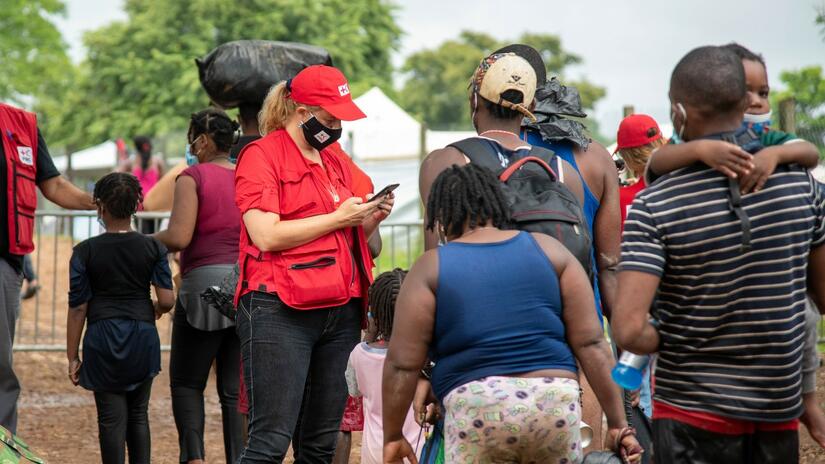Geneva, 17 December 2021 – In a year marked by exacerbated difficulties due to Covid-19 and climate-related disasters, the humanitarian situation of migrants around the world has worsened, the International Federation of Red Cross and Red Crescent Societies (IFRC) warned ahead of International Migrants Day on 18 December.
Francesco Rocca, President of the IFRC, said:
“2021 has been another terrible year for migrants across the world. Far too many migrants continue to face significant humanitarian needs with devastating consequences, with many taking life-threatening journeys, others excluded from essential services and critical protection, and yet more facing hostility and exclusion in countries of transit and destination. Governments have the duty to protect human dignity and save lives, and humanity must be at the centre of any and all decisions. When did we forget that?”
To date, the numbers of migrants have reached record levels at 281 million across the world. While many migrants are able to search for a better life in a safe way, thousands continue to embark on dangerous, life-threatening journeys with only the clothes on their backs. In 2021 alone, more than 1,600 people are reported to have died or gone missing on the Central Mediterranean route and more than 1,000 in the Americas, but the actual numbers are thought to be much higher.
Climate-related disasters have already forced millions of people to flee their homes and the numbers are expected to continue to increase in the years to come. The socio-economic impacts of the Covid-19 pandemic in the past two years have also hit migrants particularly hard due to pre-existing vulnerabilities, precarious livelihoods, lack of state support as well as movement restrictions. Migrants have also been disproportionately affected in terms of health care and lack of access to vaccines.
“All over the world, migrants face enormous risks to their lives, safety, dignity, human rights and well-being. Governments must provide people on the move access to adequate food, shelter, basic healthcare, and legal advice about their rights irrespective of migration status. At the same time, humanitarian organisations must be granted unconditional access to provide humanitarian assistance to all people in need,” President Rocca added.
The IFRC network has a global presence along migratory routes, including at sea on the world’s deadliest route in the Central Mediterranean, providing humanitarian support to migrants throughout their journeys - in countries of origin, transit and destination. In at least 110 countries and in a coordinated manner across borders, National Red Cross and Red Crescent Societies provide life-saving assistance and protection to migrants regardless of their legal status, based on their needs and vulnerabilities.
“On this International Migrants Day and every day, we will continue to make the voices of migrants in vulnerable situations heard. No human being is illegal, and we will not stay silent as their mistreatment continues. Now is the time for all governments to finally show some humanity,” President Rocca concluded.
For more information or to arrange an interview, contact:
In Geneva: Tommaso Della Longa, +41 79 708 4367, [email protected]
In Geneva: Ann Vaessen, +41 79 405 77 50, [email protected]

